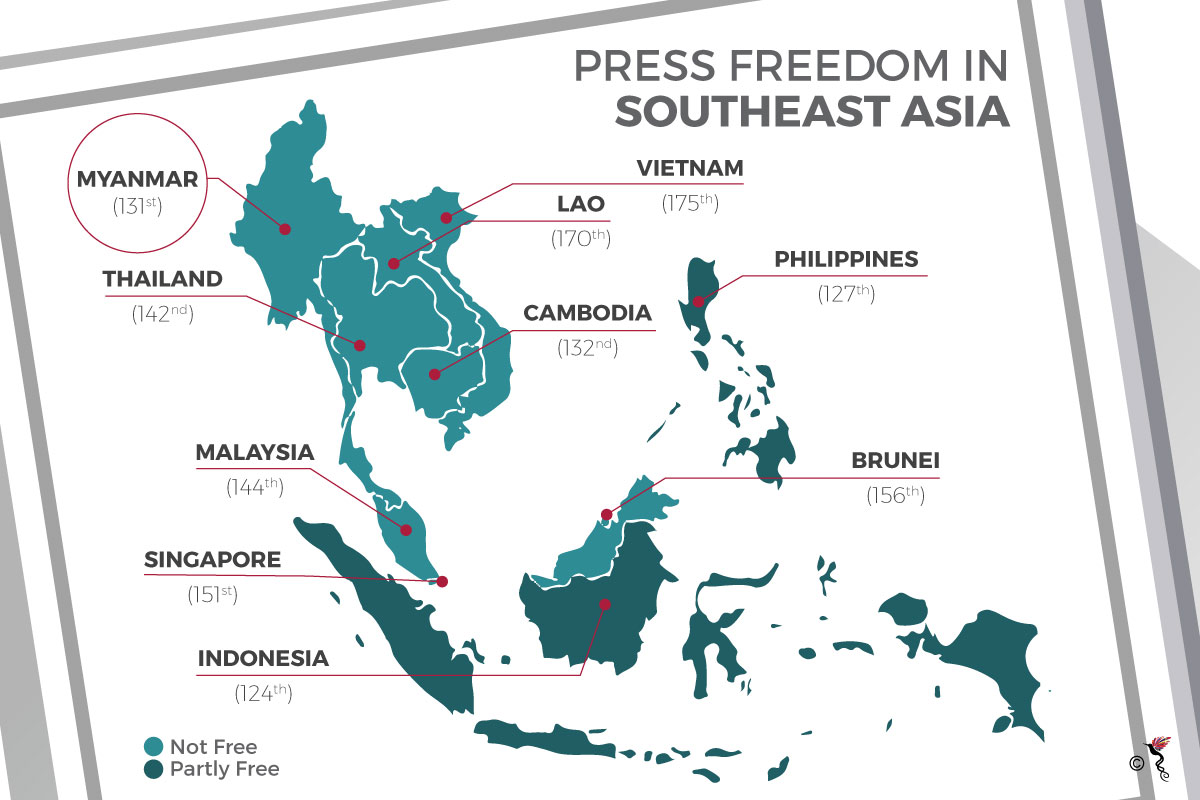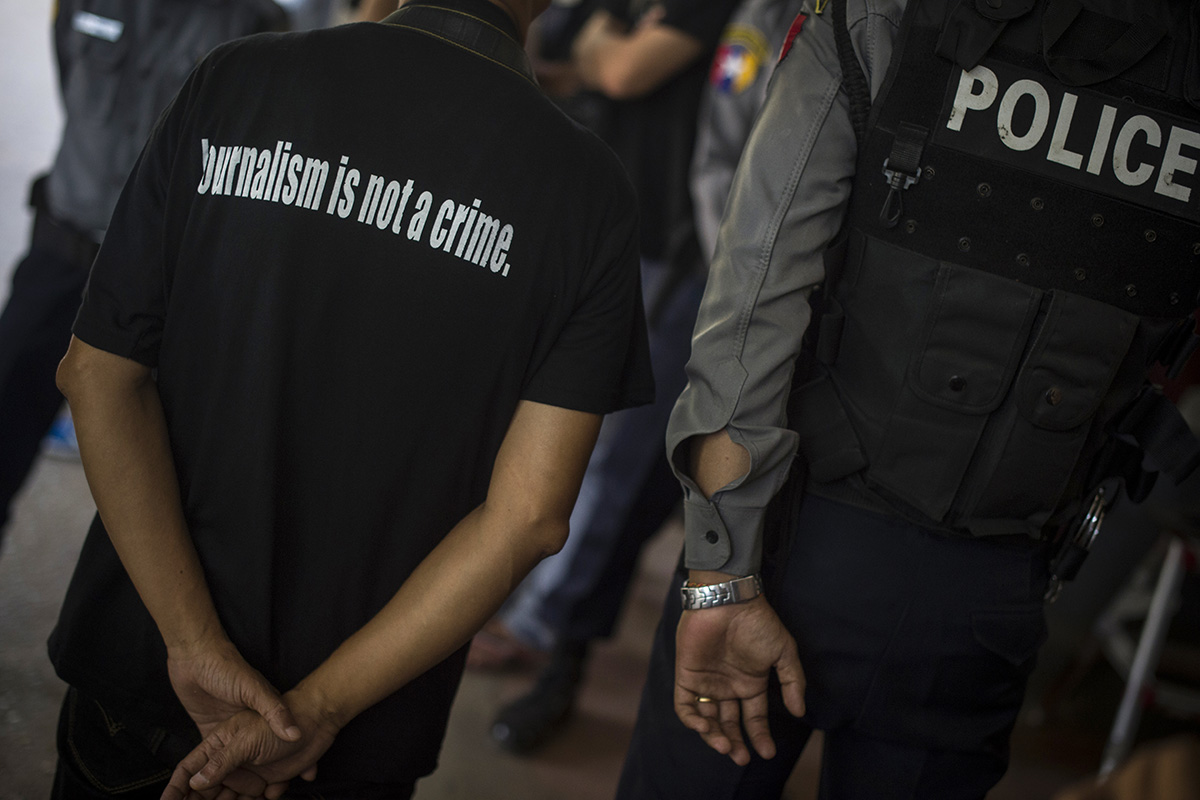Myanmar was never a frontrunner when it came to press freedom in the Southeast Asian region. However, there was a glimmer of hope when the party of Aung San Suu Kyi, a Nobel Laureate kept under house arrest for years because of her democratic activism, won historic elections in 2015. This led many to expect that more media freedom would follow.
Fast forward to today, it seems that the country’s press freedom has only been shrinking. Just yesterday, two Reuters journalists were charged by prosecutors in a Myanmar court with breaching a colonial-era secrecy law that carries up to 14 years in jail. The Official Secrets Act punishes anyone who "obtains, collects, records or publishes... any official document or information" which could be "useful to an enemy".
Myanmar authorities have previously used the law to prosecute and imprison journalists who reported on military affairs perceived as sensitive, research by the Committee to Protect Journalists (CPJ) shows.

Source: 2017 World Press Freedom Index
This charge comes after Wa Lone and Kyaw Soe Oo, both of Burmese nationality, were arrested in December under the Official Secrets Act after they were allegedly given classified documents by two policemen over dinner in Yangon.
It was said that the pair had been previously reporting on the situation in western Rakhine state, where more than 650,000 Rohingya refugees have fled over the border to Bangladesh. The military has made it impossible for anyone to cover the current situations by denying reporters access to the area since it begun.
Both press freedom and the Rohingya crisis issue are considered combustible issues in the country. This case of diminishing press freedom has clearly spelled out Myanmar’s troubled transition to democracy after almost five decades of junta ruling.
Reactions
This recent incident of journalist arrests has provoked a volley of calls for immediate releases of Wa Lone and Kyaw Soe Oo. The case against the Reuters journalists has shocked many parties including press associations and diplomats.
The US Embassy in Myanmar immediately expressed disappointment and called for the "immediate release" of the reporters.
"For democracy to succeed and flourish, journalists must be able to do their jobs," the embassy statement added.
According to AFP, deputy Asia director of Human Rights Watch, Phil Robertson said "..These charges are a travesty of justice and should be dropped."
Edgardo Legaspi, Executive Director of the Southeast Asian Press Alliance (SEAPA) stated in an e-mail correspondence with The ASEAN Post, "It is disappointing that the government decided to pursue the charges against Wa Lone and Kyaw Soe Oo, based on the archaic colonial-era Official Secrets Act (1923)."
"We reiterate our earlier call to release the two journalists immediately and unconditionally, as the basis for their arrest is unfounded. Wa Lone and Kyaw Soe Oo were only doing their jobs as journalists in trying to overcome the authorities' suppression of information on the situation in Rakhine state," he added.
Prior to the charges yesterday, former US president Bill Clinton also weighed in on the issue.
"A free press is critical to a free society—the detention of journalists anywhere is unacceptable," he tweeted on Monday.
"The Reuters journalists being held in Myanmar should be released immediately."

Source: Twitter
History of Myanmar’s withering press freedom
Myanmar, which is ranked 131st out of 180 countries in the 2017 World Press Freedom Index, saw 11 journalists being arrested in 2017 alone for various reasons including coverage of the Rohingya issue, drug issues and others.
Three Myanmar journalists were arrested in June last year after reporting on a drug-burning ceremony. According to AFP, The reporters were charged with unlawful association, a law used against supporters of Myanmar's many ethnic armed organisations fighting for autonomy in border areas.
In July, investigative journalist Swe Win was arrested at Yangon's airport for making a comment on Facebook criticising a nationalist monk. He was then charged under the infamous 66(d) statute, which covers online defamation.
In October three journalists and their driver were arrested for flying a drone near parliament while working for Turkish broadcaster TRT.
The reporters consisted of Myanmar national Aung Naing Soe, Malaysian journalist Mok Choy Lin and Singaporean cameraman Lau Hon Meng, were later jailed for two months along with their driver Hla Tin for “violating a colonial-era aircraft act.”
Although media censorship was officially lifted in 2012, journalists and other media establishments continue to practice self-censorship to avoid any criticism of the government or the armed forces in fears that the same fate will befall unto them. Only time will tell if the press freedom in Myanmar will continue to taper or find its way up under the leadership of Aung San Suu Kyi.
Recommended stories:
